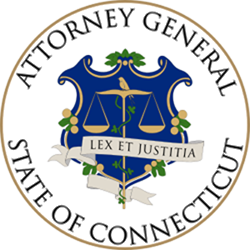2017 Formal Opinions
Page 1 of 1
-
2017-02 Formal Opinion, Attorney General, State of Connecticut
Governor Malloy has requested an opinion, in light of the enactment of Special Act 15-7 and the subsequent developments pursuant to it, of the risks associated with moving forward with the process for authorizing a casino gaming facility operated by an entity jointly owned by the Mashantucket Pequot Tribal Nation (MPTN) and the Mohegan Tribe of Indians of Connecticut (Mohegan) (collectively, Tribes).
-
2017-03 Formal Opinion, Attorney General, State of Connecticut
Honorable Senator Bob Duff has asked whether certain potential changes to Connecticut's Education Cost Sharing ("ECS") formula would violate our state constitution. Specifically, you ask whether our constitution requires that the ECS formula measure a town's ability to raise property tax revenue "using a ratio of ninety percent property wealth and ten percent income wealth."
-
2017-04 Formal Opinion, Attorney General, State of Connecticut
Commissioner Robert Klee asked my office for an opinion identifying the owner of a structure commonly known as the Stonington Harbor Breakwater, which is located in the Stonington Harbor adjacent to Stonington, CT (the "Breakwater").
-
2017-05 Formal Opinion, Attorney General, State of Connecticut
Formal opinion on whether, for purposes of administering the provisions of Conn. Gen. Stat. § 29-28(b), a resident of the Mashantucket Pequot Tribal Nation (MPTN) reservation is a bona fide permanent resident of the Town of Ledyard such that local authorities are empowered to issue a temporary state permit to such individuals, and based thereon, the Commissioner of the Department of Emergency Services and Public Protection (Commissioner) is authorized to issue a state permit to carry pistols and revolvers.
-
2017-06 Formal Opinion, Attorney General, State of Connecticut
Speaker Aresimowicz and Majority Leader Ritter have requested an opinion about whether the legal principles and cautions set forth in Attorney General Opinion No. 89-11 , 1989 WL 505894 (May 9, 1989) ("Opinion 89-11 ") concerning the constitutionality of legislative enactments altering the provisions of collective bargaining agreements between the State and its employees remain in force today. Although subsequent cases have further developed the law, we conclude that the principles and cautions expressed in Opinion 89-11 continue to apply.
-
2017-07 Formal Opinion, Attorney General, State of Connecticut
An opinion about certain legal questions pertaining to a proposed police training facility in the Town of Griswold. Specifically, you ask (1) whether the requirements under Chapter 297a of the General Statutes relating to priority funding areas apply to the proposed training facility; (2) whether the Department of Administrative Services (DAS) has satisfied the requirement of Conn. Gen. Stat. § 16a-35e that state agencies cooperate with municipalities to ensure programs and activities in rural areas sustain village character; and (3) whether the proposed training facility requires the approval of the State Properties Review Board as part of the State Facility Plan.
-
2017-08 Formal Opinion, Attorney General, State of Connecticut
An opinion on questions about the Governor's authority to direct the expenditure of funds by executive order in the absence of legislatively enacted appropriations.
-
2017-09 Formal Opinion, Attorney General, State of Connecticut
Formal opinion concerning two matters identified in the State of Connecticut Auditors' Report, Military Department, for the Fiscal Years Ended June 30, 2012 and 2013 ("Auditors' Report"). First, you have asked whether the requirements under Connecticut General Statutes § 4-37e et seq. pertaining to foundations established for the principal purpose of supporting or improving state agencies or for coordinated emergency recovery purposes apply to the Connecticut National Guard Foundation, Inc. (CNGFI). Second, you have asked whether the authority of the Governor of the State of Connecticut pursuant to the provisions of Connecticut General Statutes §§ 27-9 and 27-10, as delegated to and administered by the Connecticut Miiitary Depmtment (CTMD), is restricted to ordering members of the Connecticut State Guard to active service under the "State Active Duty" (SAD) program only for "emergency situations" as suggested by the Auditors' Report.
-
2017-01 Formal Opinion, Attorney General, State of Connecticut
Senator Fasano's request on the requirements of Conn. Gen. Stat. §3-125a, which provides that the General Assembly may reject a settlement agreement by a "three-fifths vote of each house."


